

A Never-Ending Immune Battle in ME/CFS? The Regulatory T-cell / Herpesvirus Hypothesis. The failed Rituximab trial might seem like the death knell for autoimmunity in chronic fatigue syndrome (ME/CFS) but it’s not – not by a long shot.
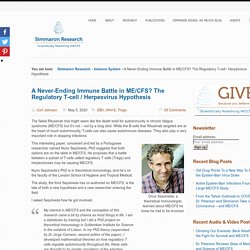
While the B-cells that Rituximab targeted are at the heart of much autoimmunity, T-cells can also cause autoimmune diseases. They also play a very important role in stopping infections. Once Sepúlveda, a theoretical immunologist, learned about ME/CFS he knew he had to be involved. This interesting paper, conceived and led by a Portuguese researcher named Nuno Sepúlveda, PhD suggests that both options are on the table in ME/CFS. A Never-Ending Immune Battle in ME/CFS? The Regulatory T-cell/Herpesvirus Hypothesis.
TH2 Dominance. Inflammation in CFS/ME. Natural Killer Cell Reduced Cytotoxicity and Irregularities. Scientists Find Clues Into Cognitive Dysfunction in Chronic Fatigue Syndrome. Immune Study Adds to Evidence Of Body-Wide Problems With Energy Production in Chronic Fatigue Syndrome (ME/CFS) Increased expression of CD24 …could thus reflect abnormalities in maintaining appropriate ATP generation (in ME/CFS).

The authors Numerous studies suggest problems with energy production exist in chronic fatigue syndrome (ME/CFS). The huge energy needs exertion places on the muscles and brain suggest they’re an obvious place for energy production problems to show up. Ramping up to fight off pathogens also places extreme demands on energy production in immune cells. Exhausted Immune System? The SMCI's Research Program Takes Deep Dive Into Immunity and Energy. Early Results Suggest Two Radically Different Immune Subsets Present in Chronic Fatigue Syndrome (ME/CFS) Stanford Exercise Study Shows Different Immune Response in Chronic Fatigue Syndrome (ME/CFS) Hornig: two immune signatures in ME/CFS – Shoutout about ME. Researchers have identified distinct immune changes in patients diagnosed with chronic fatigue syndrome, known medically as myalgic encephalomyelitis (ME/CFS) or systemic exertion intolerance disease.

The findings, by a team at the Center for Infection and Immunity at Columbia University’s Mailman School of Public Health, could help improve diagnosis and identify treatment options for the disabling disorder, in which symptoms range from extreme fatigue and difficulty concentrating to headaches and muscle pain. These immune signatures represent robust physical evidence that ME/CFS is a biological illness as opposed to a psychological disorder, and the first evidence that the disease has distinct stages.
“It appears that ME/CFS patients are flush with cytokines until around the three-year mark, at which point the immune system shows evidence of exhaustion and cytokine levels drop,” says Dr. Hornig. Stuck in High Gear In 2012, W. Co-authors include Andrew F. More. Major Study Suggests Early Immune Activation May Drive Chronic Fatigue Syndrome - Simmaron Research. “This study delivers what has eluded us for so long: unequivocal evidence of immunological dysfunction in ME/CFS and diagnostic biomarkers for disease” W.

Ian Lipkin Big study – big results Distinct plasma immune signatures in ME/CFS are present early in the illness. Hornig. M. It’s a major study indeed – the first, I believe, to come out of the Hutchins Foundation’s Chronic Fatigue Initiative and the media is picking it up quickly. Gut inflammation in chronic fatigue syndrome. Chronic fatigue syndrome (CFS) is a clinical condition characterized by persistent and unexplained relapsing fatigue that is worsened by physical and mental exertion [1, 2].
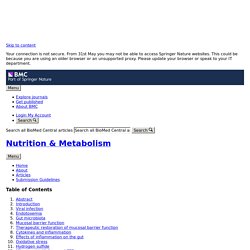
According to the Centers for Disease Control (CDC) report, the overall prevalence of CFS in the USA is as many as 4 million people [3, 4]. Up to 80% of those affected are women [5]. These individuals suffer from severe fatigue that impairs daily activity, diminishes quality of life (QOL) for years, and has no known cure. CFS represents an economic burden for society and healthcare institutions [6].
The CDC originally proposed the term CFS in 1988. Along with disabling fatigue, CFS is characterized by neuropsychological disturbances such as headaches, myalgia, arthralgia, and post-exertional malaise; cognitive difficulties, with impaired memory and concentration; un-refreshing sleep; and mood changes, such as depression and anxiety [8]. A brain MRI study of chronic fatigue syndrome: evidence of brainstem dysfunction and altered homeostasis - Barnden - 2011 - NMR in Biomedicine.
Immune Activation, Chronic Inflammation and Mitochondrial Dysfunction in Autoimmune Disease and ME/CFS - CFS Treatment Guide. Reductions in circulating levels of IL-16, IL-7 and VEGF-A in myalgic encephalomyelitis/chronic fatigue syndrome. - PubMed - NCBI. Novel identification and characterisation of Transient receptor potential melastatin 3 ion channels on Natural Killer cells and B lymphocytes: effe... - PubMed - NCBI. Chronic fatigue syndrome and the immune system: Where are we now? - PubMed - NCBI.
Major Breakthrough in Chronic Fatigue Syndrome (ME/CFS)? Aussies Believe Biomarker Found. The media reports have been sizzling! Griffith University, the home of the NCNED group in Australia that produced the study, called it “groundbreaking”. IFL Science lead off with a piece called “People With Chronic Fatigue Have A Defective Channel In Immune System Cells” which stated, “The finding confirms earlier research that CFS is a biological condition, not a psychological one, and opens lines of inquiry for potential treatment options.” Even a government official got involved telling the Tech Times “This discovery is great news for all people living with Chronic Fatigue Syndrome (CFS) and the related Myalgic Encephalomyelitis (ME), as it confirms what people with these conditions have long known – that it is a ‘real’ illness – not a psychological issue,” Leeanne Enoch, the Science Minister of Queensland.
Donald Staines, one of the researchers associated with the study, went so far as to say “This is huge because for the first time we have documented the pathology in this illness. Chronic fatigue syndrome: Inflammation, immune function, and neuroendocrine interactions. Article First Online: Abstract Investigations into the underlying cause of chronic fatigue syndrome have advanced the field considerably in the past year.
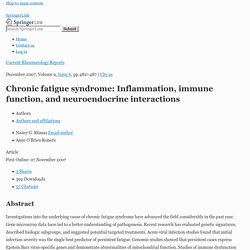
Gene microarray data have led to a better understanding of pathogenesis. Recent research has evaluated genetic signatures, described biologic subgroups, and suggested potential targeted treatments. Keywords. Living With ME/CFS: Immune System Abnormalities in ME/CFS. (NOTE: Many of you expressed interest in hearing more about how Immunovir has helped me this past year, so I started to write a blog post about that, but I quickly discovered that I needed to explain how ME/CFS affects the immune system before I could explain how Immunovir treats it.
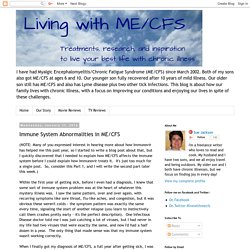
It's just too much for a single post. So, consider this Part 1, and I will write the second part later this week.) Within the first year of getting sick, before I even had a diagnosis, I knew that some sort of immune system problem was at the heart of whatever this mystery illness was. I saw the same pattern, over and over again, with recurring symptoms like sore throat, flu-like aches, and congestion, but it was obvious these weren't colds - the symptom pattern was exactly the same every time, signaling the start of another relapse (you learn to instinctively call them crashes pretty early - it's the perfect description). Trying to Understand the Origin of ME/CFS. By John Bochenek ME/CFS has been around for decades, perhaps much longer under other names such as neurasthenia.
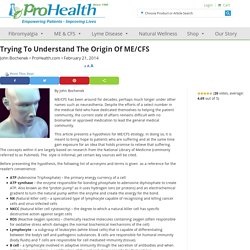
Despite the efforts of a select number in the medical field who have dedicated themselves to helping the patient community, the current state of affairs remains difficult with no biomarker or approved medication to lead the general medical community. This article presents a hypothesis for ME/CFS etiology. In doing so, it is meant to bring hope to patients who are suffering and at the same time gain exposure for an idea that holds promise to relieve that suffering. The concepts within it are largely based on research from the National Library of Medicine (commonly referred to as Pubmed). Before presenting the hypothesis, the following list of acronyms and terms is given as a reference for the reader’s convenience: Figure 1 There are many feedback loops that occur in the body. Treating Immune Dysfunction in ME/CFS. Living With ME/CFS: Throwback Thursday: Immune Dysfunction in ME/CFS. This is my third Throwback Thursday post where I pull together some of my older blog posts on a single topic related to ME/CFS and its treatment - the first was on Physical Therapy for ME/CFS and the second on Orthostatic Intolerance (OI), a condition that is an integral part of ME/CFS.
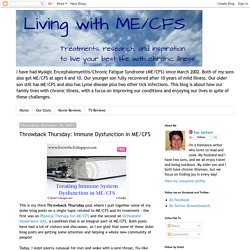
Both posts have had a lot of visitors and discussion, so I am glad that some of these older blog posts are getting some attention and helping a whole new community of people! Today, I slept poorly (unusual for me) and woke with a sore throat, flu-like aches, and feeling awful. All of these are signs that my dysfunctional immune system has been sent into overdrive. It can happen from overexertion, though treating OI mostly eliminated that. This time of year, these kind of immune symptoms are usually due to being exposed to some sort of virus or other infection - there are many of them going around! Chronic fatigue syndrome: Harvey and Wessely's (bio)psychosocial model versus a bio(psychosocial) model based on inflammatory and oxidative and nit... - PubMed - NCBI.